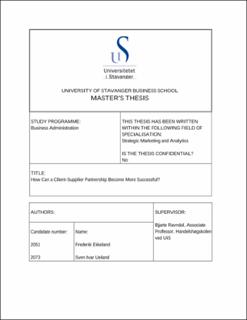| dc.description.abstract | Partnerships have become an increasingly important part of a firm’s competitive strategy, but many of them seem to fail. The goal of this thesis is therefore to explore critical factors for partnership success and determine how a client-supplier partnership can become more successful. This is done by using the critical success factors presented by Kale & Singh (2009) and conducting a case study of the partnership between Magnar Eikeland Kontorutstyr AS and their supplier EMO, as well as the partnership between Magnar Eikeland Kontormaskiner AS and their supplier Ricoh Norge AS. The partnerships operate within the office supplies, and office machinery and digital solutions industry, respectively.
The data collection has occurred through structured interviews with relevant employees within each company and has provided us with a foundation to describe how various factors affect the cooperation between partners. Our research shows that the presented theory largely coincides with our findings. However, we have discovered that contractual complexity does not necessarily have a negative impact on the dynamic between partners if their relational capital is strong. In such cases, the complexity will not be interpreted as a sign of mistrust, but rather as a way of reducing uncertainty and facilitating increased cooperation.
Furthermore, when relational capital, knowledge exchange, and feedback routines are linked to specific individuals rather than organizations, partnerships are very exposed. Relational capital, knowledge exchange, and feedback should therefore be formalized and spread among several individuals in the partnered organizations to preserve these elements within the partnership. Moreover, partners' motives and intentions can change over time and have a significant impact on their partnership. It may therefore be wise to have mechanisms in place to address these changes, for example by having procedures for conflict resolution and contract amendments. Relational capital can act as a safeguard against conflicts by decreasing the barrier for expressing yourself freely. | |
